
The Open Education Resources (OER) Working Group of the River Campus Libraries (RCL) is working toward its fourth year of an Open Education grant program and has identified more low-cost/increased-access champions across campus. This year, we are proud to announce 8 new Zero-Cost Heroes. This brings our total number to 36 over the past three years (see heroes of our first, second, third, and fourth rounds).
All of our selected heroes are instructors and faculty who, for a number of reasons, have chosen to select or create course materials that are free for their students. Each day we'll be highlighting one hero, sharing their motivations for championing free course materials, how they've worked with the library to make it happen, and what their students have to say about zero-cost materials.
Highlighting Zero-Cost Heroes is part of an ongoing RCL effort to ensure equity, access, and empowerment for all Rochester students. Other examples of this effort include the ACT commitment and much of what is found on the Open Education Services page, where you can view a number of presentations from our OER and Open Pedagogy workshop series.
Want to nominate someone as a Zero-Cost Hero? Email us at rclconsult@library.rochester.edu.
Monday’s Zero Cost Hero: J.C. Wamsley
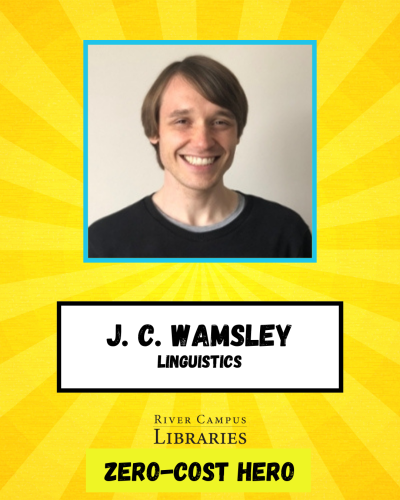
Dr. James C. Wamsley joined the Department of Linguistics as an adjunct professor last fall after completing his Ph.D. in Linguistics at Indiana University. When Dr. Wamsley needed to select a textbook for his first-time teaching LING 110: Introduction to Linguistic Analysis, he weighed his options and chose the openly licensed Essentials of Linguistics, 2nd edition, edited by Catherine Anderson et al. Information about such resources is readily available to all faculty at UR's Open Education: Resources and Services.
Luckily for students taking Dr. Wamsley’s course, the text is published online by eCampusOntario, a Canadian nonprofit that provides access to online learning and allows users to share and adapt content for non-commercial purposes if they attribute the content to its creators and share the content with the same open license.
When Dr. Wamsley taught a similar course at Indiana, he used a traditional textbook that cost about $80, a relatively reasonable sum as textbook prices go. But after a couple of colleagues mentioned Essentials of Linguistics, he was intrigued by its open license, which makes it free for his students.
He also appreciated that the book was created and is maintained by a team of experts. The textbook’s seven authors are members of the Teaching in Linguistics Community of Practice and are instructors of linguistics at Canadian universities.
As Dr. Wamsley explored the textbook online, he noted that it meets digital accessibility standards. In fact, it exceeds the minimum standards, and later editions may include additional accessibility enhancements.
He also was impressed by the inclusion of relevant video content in each chapter, as well as built-in exercises and quizzes that help students engage with the material and check their understanding. After taking it for a test drive, he was sold.
“I like the idea of having openly available information,” Dr. Wamsley said, noting that he supplements the textbook with additional course readings posted in Blackboard, thus keeping the course materials cost at zero. “I like the collaborative aspect [and] I like the increased accessibility.”
Tuesday’s Zero Cost Hero: Bruce Blaine
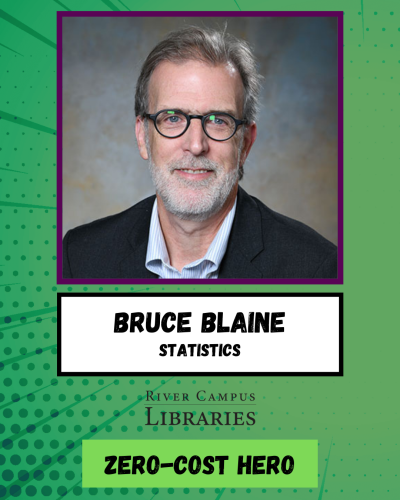
With less than a year as a University of Rochester professor of Statistics, Dr. Bruce Blaine is making a name for himself as an instructor among his students. One student from Dr. Blaine’s STAT 212: Applied Statistics nominated him to be a River Campus Libraries Zero-Cost Hero, noting that the course textbook “is a free PDF online, and contributions are encouraged but not required! The website we use for homework is also free for us as students.”
Dr. Blaine uses a variety of open-source tools in his teaching – OpenIntro Statistics as his textbook, MyOpenMath for homework and assignments, and articles and other readings that are freely accessible to UR students. OpenIntro’s course shell has the particular benefit of easing a professor’s workload by facilitating assignments, question banks, tests, course calendars, and grading.
These open course features allow Dr. Blaine to customize and add materials he chooses to guide his course content. Unlike other course texts and materials he has used in the past, with the open course materials Dr. Blaine is able to have more control over his students’ learning.
“Learning goals drive what students need,” he said. “If we can get away without using Pearson (Online Academy) or other monoliths, then, let’s do it.”
A standard introductory Statistics course normally requires students to pay about $250 for the textbook and online homework service. Multiply that by about 275 students in class and students collectively are shelling out $68,750 for just one class. Consider those costs for two semesters ($137,500) or two years ($275,000), and it's clear why students are concerned by the added costs of an already expensive college education.
Dr. Blaine has “done open source” throughout his career, including the guarantee of pre-printed book chapters published in LeanPub, a tool that allows authors to publish their work as it’s being written, before the final copy was sent to a commercial publisher. While he is committed to making his scholarship publicly available, he recognizes the importance of being paid for his work.
Mathematics and Statistics have traditionally adopted a more open culture, but Dr. Blaine is unsure how receptive other disciplines are to its usage. Still, he advocates for what open resources in the curriculum can do for students, and professors. The more this open movement can catch on throughout the disciplines, he added, the more able universities are to address low-cost options for students, particularly those with economic disadvantages.
Wednesday’s Zero Cost Heroes: The Chemistry Team
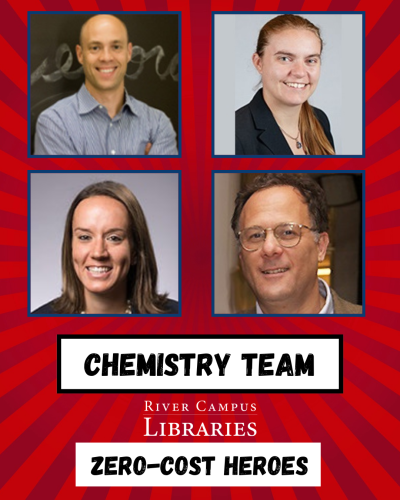
Students can save money when large lecture courses like Chemistry Concepts, Systems, and Practices (CHEM 131/132) adopt an Open Educational Resource (OER) textbook. River Campus Libraries are excited to recognize the efforts of chemistry faculty Dr. Ben Hafensteiner, Dr. Katie Knowles, Dr. Ellen Matson, and Dr. Lewis Rothberg in its latest cohort of Zero-Cost Heroes.
In a conversation with STEM librarian Sue Cardinal, Dr. Knowles shared that the team aims to diminish the cost burden on students and make the course more accessible and inclusive. According to Dr. Matson, Dr. Hafensteiner was passionate about saving students money. He wanted to minimize any burdens that got in the way of their learning, and so he suggested adopting Chemistry 2e as the course textbook.
Dr. Rothberg noted that the Chemistry 2e textbook from OpenStax, a non-profit, peer-reviewed, openly licensed textbooks resource created at Rice University, is an excellent example because it’s up-to-date, higher quality, and more sensitive to issues like diversity than the previous textbook. The development of the Chemistry 2e OpenStax textbook was coordinated by Rice faculty. Dozens of chemistry faculty from around the country were responsible for the content.
According to Dr. Rothberg, “The people who organized that effort and contributed to that book are the real heroes in this story,” he said. “Our decision to adopt it was the easy part.”
Both Dr. Knowles and Dr. Rothberg add that the best way to measure the impact is from student feedback. As yet, they haven’t received much, noting that students’ priorities are to their lecture, labs, workshops, homework, and lab reports. However, they are confident that when a textbook is free, it removes the possibility of buyer’s remorse, and it also removes the feeling of guilt that professors often feel when assigning an expensive textbook.
The OpenStax text is also useful beyond the readings. Faculty can use the open educational resource content in their lecture notes and connect it to the online homework platform they use, saving them valuable grading time. And when students seek additional practice problems, instructors can point them to the practice problems in the OpenStax text.
A River Campus Libraries Open Education Grant to Dr. Rothberg last year helped him adapt the Chemistry 2e textbook to make it even more useful for students. The course calls for students to utilize chapters out of order, which can be confusing. But with OER, content can be edited, reordered, or combined with other material in what is called “remixing.” This remix of the Chemistry 2e textbook will reorganize the chapters in the teaching order. Dr. Rothberg is also adding additional content on learning theory that will further enhance the student experience – another flexibility not available with commercial textbooks.
Thursday’s Zero Cost Hero: Lee Murray
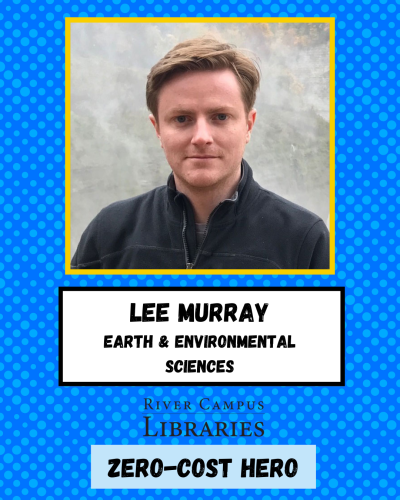
Associate Professor of Earth & Environmental Science (EESC) Dr. Lee Murray’s nomination from one of his EESC 218 Atmospheric Geochemistry students to be a Zero Cost Hero gives the kind of kudos that other students are increasingly seeking.
“He ensured that all textbooks and required readings are 100% free to access on the internet,” the student wrote in their nomination. “He said on the first day that he believes textbooks should be free to access.”
Dr. Murray said he doesn’t require students to purchase any course readings for several reasons: to reduce paper waste, to incorporate the most recent breakthroughs in the field, and to reduce students’ financial burden. Due to the nature of the courses’ content, the topics are often niche, and textbooks go quickly out of date. For course readings, he always requests that the library purchases materials or checks that his desired materials are available open access.
Dr. Murray said his motivation goes back to when he was a student.
“When I was in college, I had to work every year to pay for my textbooks,” he said. “My financial aid package didn’t include funds for course materials. Tuition is high enough and I don’t believe students should have to pay for course materials, especially in STEM.”
He said he learned about open access materials from his Ph.D. advisor, who “always included materials where students didn’t have to pay.”
Consequently, Dr. Murray has never taught a course where students have to pay for course materials. When textbook publishers try to convince him to use their books, he tells them that if they are “…not going to offer an e-license, then I (he) will never adopt this text.” Dr. Murray plans to never require students to purchase course readings in any course he teaches.
Friday’s Zero Cost Hero: REJI Program
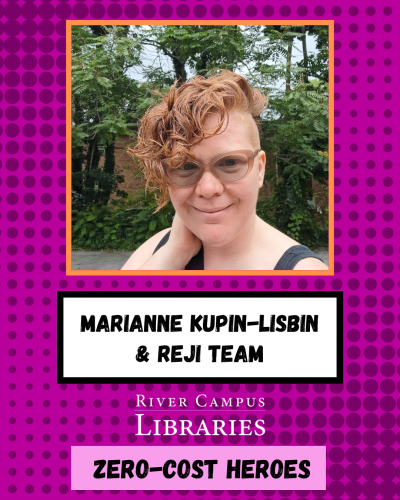
Celebrating a Zero-Cost Hero usually focuses on savings for students in course materials. But Marianne Kupin-Lisbin and the team of the Rochester Education Justice Initiative (REJI) think about the cost to their students in a very different way: the cost of access to education itself.
REJI is a University of Rochester-based program that administers college degree granting programs for students at Groveland, Attica, and Wyoming Correctional facilities. Students enroll in humanities, social science and science courses taught by UR faculty and graduate students. Kupin-Lisbin is REJI’s faculty coordinator, helping solicit, hire, and assist faculty in course development, and works closely with the River Campus Libraries to provide course packets and other library research materials for all students taking classes through REJI. She’s a Zero-Cost Hero for her work in making education accessible, enjoyable, and possible for justice-involved individuals.
Kupin-Lisbin is quick to acknowledge that the team that makes REJI successful spans the campus – teachers, staff, administrators and students all come together to create a program that reduces recidivism, challenges the status quo of dehumanization that mass incarceration depends upon, and build better lives through education.
Professor Josh Dubler, director of REJI, began the program in 2015 with seed money from AS&E, and the program is funded by AS&E, the Mellon and Mother Cabrini Health foundations. Deputy Director Eitan Freedenberg (VCS, Ph.D. ‘20), oversees grant management and day-to-day logistics. Securing funding and coordinating with the Department of Correction and Community Supervision (DOCCS) is challenging, but it’s this work that provides access to education for students.
When Kupin-Lisbin began teaching for the college-in-prison program through Cornell University, she created large course packs of materials with hundreds of pages of documentation. Over time, thinking about Universal Design for Learning, she opted for more active learning, using materials from Reacting to the Past, an active learning pedagogy of role-playing games which uses primary documents and allows students to take on different historical roles.
This also allows students to understand the flow of historical events through writing, speaking and role play. It makes thinking critically about history more personal. And, for justice-involved students, the opportunity to engage in what Kupin-Lisbin calls “joyful effort” helps kindle the flame of love for knowledge and education.
Kupin-Lisbin works closely with faculty, noting that many volunteer additional time – adjuncts for the fall semester are working six months ahead of time to prepare materials to give DOCCS time to approve them. She also assists instructors in designing classes, as students don’t have access to computers, research libraries, calculators, teaching assistants or tutors.
And she works closely with Alice Hunt in the Teaching Center and the Office of Disability to help faculty create accessible classes, so that students need not self-identify as having a learning disability.
The costs of being a student in prison are high. Marianne notes that few students have free time to attend class, as they are all forced to work in some capacity. Students often give up phone calls, meals, showers, limited hours to purchase personal care items, and rest.
Kupin-Lisbin and the REJI program directors, faculty, and staff at the prison work diligently to lower student costs, and provide education, materials, and most of all, hope to REJI students.

